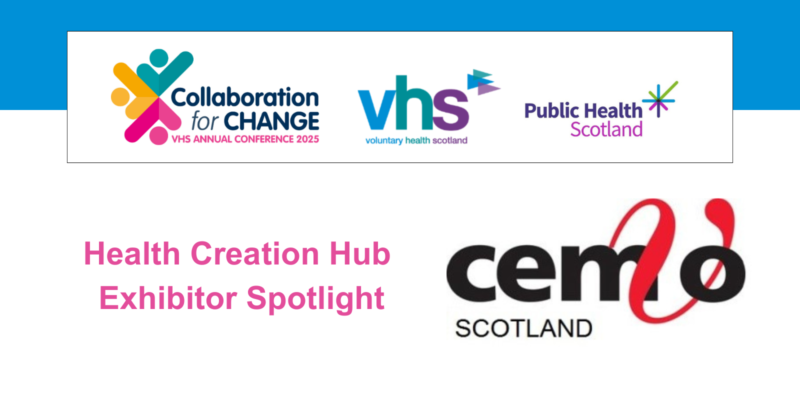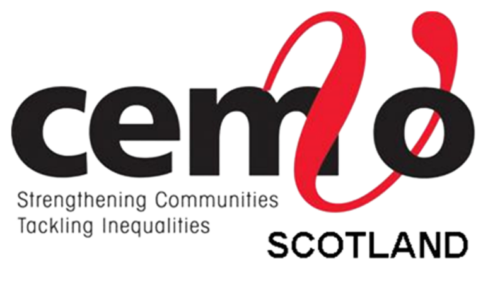
By Pui-Kei Wong (Race Equality Officer) & Francesca Malila (Race Equality & Human Rights Officer), CEMVO Scotland
Why we need to build racial equity in the voluntary health sector
Racialised health inequalities have a wide-ranging and profound impact on outcomes for ethnic minority people in the UK. For example, Black women are three times more likely than white women to die in pregnancy or childbirth in the UK[1]. In 2021, a weekly report showed rates of hospitalisation or death involving Covid-19 in Scotland were four times higher in Pakistani and mixed groups compared to the White Scottish group. For Indian, other Asian, Caribbean or Black, and African groups, this was twofold higher.[2]
Such serious disproportionate impacts are fundamentally caused by structural racism, and these conversations are not new[3].
To disrupt these complex systems of oppression and discrimination, we need to foster stronger collaborations to build racial equity with people, communities and organisations. Racial equity involves taking the necessary steps to ensure the right tools, resources, and measures are in place that can lead to better health outcomes for ethnic minority people and marginalised communities.
Race for Human Rights: a fight for race equality through anti-racism and human rights
On the Race for Human Rights team at CEMVO Scotland, we promote an understanding of human rights and anti-racism as inextricably linked. To do this, we facilitate community engagement, give expertise on policy development and provide consultancy support to third and public sector organisations. We are excited to be working with VHS to support them and their members in tackling racialised health inequalities.
Through our engagement with ethnic minority communities, we have heard that there are multiple barriers to accessing health and wellbeing services, including[4]:
- Interpersonal racism
- Mistrust
- Inaccessible and not inclusive services
- Ineffective complaints procedures
- Socio-economic disadvantages
We recognise that voluntary health organisations provide vital support to those who experience health inequalities and often fill the gaps where statutory services fall short. Adopting an anti-racist and human rights-based approach in organisations is essential to ensure that you are serving the most marginalised groups in our society. Being ‘open to all’ on paper isn’t enough; anti-racism means taking pro-active steps to understand racial injustice and tackle it. Human rights provide us with not only a framework of legal entitlements to challenge inequalities including racism, but also a set of principles to guide policies and practices so that we are promoting dignity and empowering rights holders.
What are the challenges?
Public service providers and organisations we work with commonly experience challenges that include:
- Staff not feeling confident to address racism
- Lack of workforce diversity
- Lack of support from leadership/senior management
- Gaps in equalities data and high non-disclosure rates
While it is a natural tendency to focus on the problems that the organisation externally faces, the reality is that for organisations to create meaningful change, internal work needs to be done to establish a strong, anti-racist foundation to dismantle racism at all levels.
Organisations need to start with realistic solutions to improve their internal systems. This includes:
- Effective community engagement strategy. Incorporate a feedback loop to measure progress and success. Keep people informed and offer incentives to make them feel valued, and that it’s not just tokenistic.
- Continuous learning and development. Regular training for staff to increase their confidence. Anti-racism is a continuous, life-long journey of learning and unlearning. Annual online modules are not enough!
- Leadership and accountability. Promote an anti-racist culture and a psychologically safe environment as leaders, model trust and responsibility. Promote feedback and transparent complaint procedures.
- Reviewing policies and procedures. For example, data collection processes, inclusive recruitment, anti-racism and equality strategies. Check for biases and embed inclusivity.
Each organisation has different needs and challenges, and there is no one-size-fits-all approach. This is why we must collaborate to seek solutions together, exchange learning, and maximise our resources for change.
This is a call for equality organisations and the voluntary health sector to join hands to tackle intersectional, racialised health inequalities.
Upcoming work
Our Race for Human Rights team at CEMVO Scotland will be supporting VHS in co-creating anti-racism guidance with VHS members. Look out for us at the upcoming annual VHS conference to find out more.
To find out more about CEMVO Scotland, please visit https://cemvoscotland.org.uk/ or email R4HR@cemvoscotland.org.uk.
[1] MBRRACE-UK (2024) MBRRACE-UK Maternal MAIN Report 2024 V2.0 ONLINE.pdf
[2]Public Health Scotland (2022) https://www.publichealthscotland.scot/media/11979/pra_annual-monitoring-report-on-ethnic-health-inequalities.pdf
[3] How Racism Affects Health (2025) Health Foundation_Runnymede Report_Final_Mar-2025.pdf
[4] Report commissioned by SHRC (2024) The Views of People in Scotland: ICERD Lived Experience Report
 We’re so pleased to have CEMVO in our Health Creation Hub. Besides attending the conference, they’ll be gathering data that will help us create our anti-racism guidance. So, seek them out for a chat!
We’re so pleased to have CEMVO in our Health Creation Hub. Besides attending the conference, they’ll be gathering data that will help us create our anti-racism guidance. So, seek them out for a chat!
